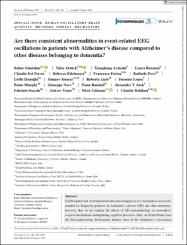| dc.contributor.author | Güntekin, Bahar | |
| dc.contributor.author | Aktürk, Tuba | |
| dc.contributor.author | Arakaki, Xianghong | |
| dc.contributor.author | Bonanni, Laura | |
| dc.contributor.author | Del Percio, Claudio | |
| dc.contributor.author | Edelmayer, Rebecca | |
| dc.contributor.author | Farina, Francesca | |
| dc.contributor.author | Ferri, Raffaele | |
| dc.contributor.author | Hanoğlu, Lütfü | |
| dc.contributor.author | Kumar, Sanjeev | |
| dc.contributor.author | Lizio, Roberta | |
| dc.contributor.author | Lopez, Susanna | |
| dc.contributor.author | Murphy, Brian | |
| dc.contributor.author | Noce, Giuseppe | |
| dc.contributor.author | Randall, Fiona | |
| dc.contributor.author | Sack, Alexander T. | |
| dc.contributor.author | Stocchi, Fabrizio | |
| dc.contributor.author | Yener, Görsev | |
| dc.contributor.author | Yıldırım, Ebru | |
| dc.contributor.author | Babiloni, Claudio | |
| dc.date.accessioned | 2022-12-19T10:12:02Z | |
| dc.date.available | 2022-12-19T10:12:02Z | |
| dc.date.issued | 2022 | en_US |
| dc.identifier.citation | Güntekin, B., Aktürk, T., Arakaki, X., Bonanni, L., Del Percio, C., Edelmayer, R. ... Babiloni, C. (2022). Are there consistent abnormalities in event-related EEG oscillations in patients with Alzheimer's disease compared to other diseases belonging to dementia? Psychophysiology, 59(5). https://doi.org/10.1111/psyp.13934 | en_US |
| dc.identifier.issn | 0048-5772 | |
| dc.identifier.issn | 1469-8986 | |
| dc.identifier.uri | https://doi.org/10.1111/psyp.13934 | |
| dc.identifier.uri | https://hdl.handle.net/20.500.12511/10145 | |
| dc.description.abstract | Cerebrospinal and structural-molecular neuroimaging in-vivo biomarkers are recommended for diagnostic purposes in Alzheimer’s disease (AD) and other dementias; however, they do not explain the effects of AD neuropathology on neurophysiological mechanisms underpinning cognitive processes. Here, an Expert Panel from the Electrophysiology Professional Interest Area of the Alzheimer’s Association reviewed the field literature and reached consensus on the event-related electroencephalographic oscillations (EROs) that show consistent abnormalities in patients with significant cognitive deficits due to Alzheimer’s, Parkinson’s (PD), Lewy body (LBD), and cerebrovascular diseases. Converging evidence from oddball paradigms showed that, as compared to cognitively unimpaired (CU) older adults, AD patients had lower amplitude in widespread delta (>4 Hz) and theta (4–7 Hz) phase-locked EROs as a function of disease severity. Similar effects were also observed in PD, LBD, and/or cerebrovascular cognitive impairment patients. Non-phase-locked alpha (8–12 Hz) and beta (13–30 Hz) oscillations were abnormally reduced (event-related desynchronization, ERD) in AD patients relative to CU. However, studies on patients with other dementias remain lacking. Delta and theta phase-locked EROs during oddball tasks may be useful neurophysiological biomarkers of cognitive systems at work in heuristic and intervention clinical trials performed in AD patients, but more research is needed regarding their potential role for other dementias. | en_US |
| dc.description.sponsorship | European Committee (H2020-EU.1.3.1.H2020-MSCA-ITN-ETN-2016 project) | en_US |
| dc.language.iso | eng | en_US |
| dc.publisher | John Wiley and Sons Inc | en_US |
| dc.rights | info:eu-repo/semantics/openAccess | en_US |
| dc.subject | Alzheimer’s Disease Mild Cognitive Impairment (ADMCI) | en_US |
| dc.subject | Alzheimer’s Disease (AD) | en_US |
| dc.subject | Event- Related Desynchronization | en_US |
| dc.subject | Event- Related Oscillations (EROs) | en_US |
| dc.subject | Event- Related Potentials (ERPs) | en_US |
| dc.subject | Event- Related Synchronization | en_US |
| dc.subject | Lewy Body Dementia (LBD) | en_US |
| dc.subject | Parkinson’s Disease (PD) | en_US |
| dc.subject | Vascular Cognitive Impairment (VCI) | en_US |
| dc.title | Are there consistent abnormalities in event-related EEG oscillations in patients with Alzheimer's disease compared to other diseases belonging to dementia? | en_US |
| dc.type | article | en_US |
| dc.relation.ispartof | Psychophysiology | en_US |
| dc.department | İstanbul Medipol Üniversitesi, Rektörlük, Rejeneratif ve Restoratif Tıp Araştırmaları Merkezi (REMER) | en_US |
| dc.department | İstanbul Medipol Üniversitesi, Rektörlük, Sağlık Bilim ve Teknolojileri Araştırma Enstitüsü | en_US |
| dc.department | İstanbul Medipol Üniversitesi, Tıp Fakültesi, Temel Tıp Bilimleri Bölümü, Biyofizik Ana Bilim Dalı | en_US |
| dc.department | İstanbul Medipol Üniversitesi, İMÜ Meslek Yüksekokulu, Elektronörofizyoloji Ana Bilim Dalı | en_US |
| dc.department | İstanbul Medipol Üniversitesi, Tıp Fakültesi, Dahili Tıp Bilimleri Bölümü, Nöroloji Ana Bilim Dalı | en_US |
| dc.authorid | 0000-0002-0860-0524 | en_US |
| dc.authorid | 0000-0002-7555-3801 | en_US |
| dc.authorid | 0000-0003-4292-5717 | en_US |
| dc.authorid | 0000-0002-7715-3035 | en_US |
| dc.identifier.volume | 59 | en_US |
| dc.identifier.issue | 5 | en_US |
| dc.relation.publicationcategory | Makale - Uluslararası Hakemli Dergi - Kurum Öğretim Elemanı | en_US |
| dc.identifier.doi | 10.1111/psyp.13934 | en_US |
| dc.institutionauthor | Güntekin, Bahar | |
| dc.institutionauthor | Aktürk, Tuba | |
| dc.institutionauthor | Hanoğlu, Lütfü | |
| dc.institutionauthor | Yıldırım, Ebru | |
| dc.identifier.wosquality | Q1 | en_US |
| dc.identifier.wos | 000691021400001 | en_US |
| dc.identifier.scopus | 2-s2.0-85113871269 | en_US |
| dc.identifier.pmid | 34460957 | en_US |
| dc.identifier.scopusquality | Q1 | en_US |


















